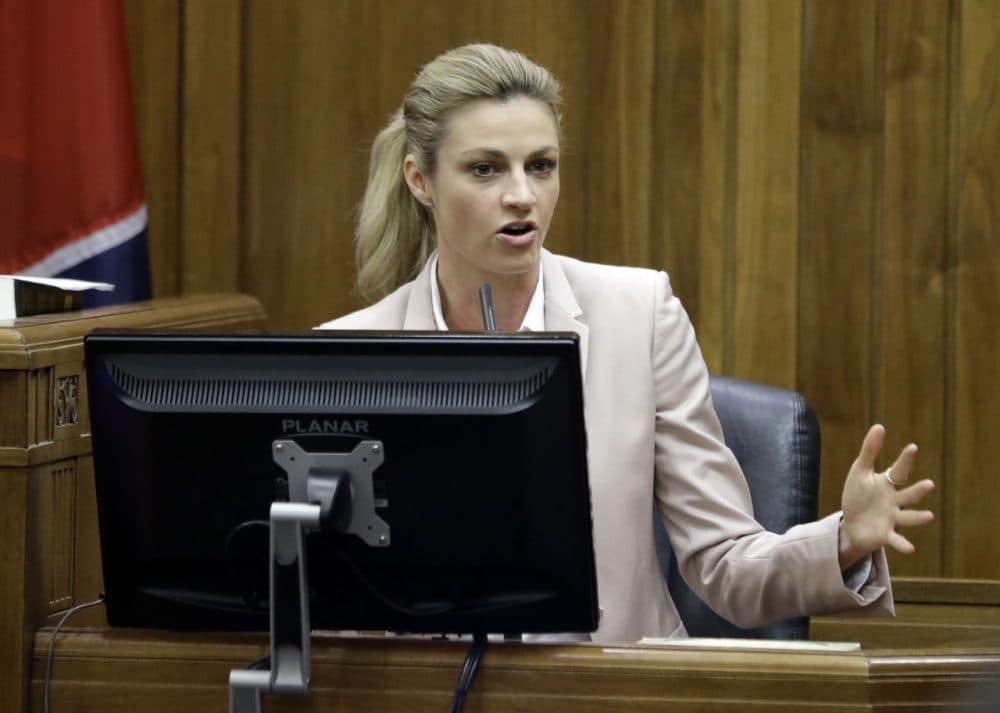Advertisement
3 Stories You Should Know: Andrews, Endorsements, Sharapova
Resume
This week, former Yankee great Paul O'Neill made waves when he endorsed Donald Trump for President. While some fans were horrified, Sports on Earth's Will Leitch took a more nuanced view. That's just one of this week's "3 Stories You Should Know."
Will Leitch and Andrea Kremer of the NFL Network and HBO joined Bill Littlefield for this week's roundtable.
1. Erin Andrews' Legal Victory
This week, a Nashville jury awarded sportscaster Erin Andrews $55 million in her lawsuit stemming from a 2008 incident where a stalker filmed her through a peephole while she was staying at a hotel. Michael David Barrett, the man who filmed Andrews, previously spent two-and-a-half years in jail for the crime. The case has Andrea Kremer thinking about safety issues faced by women who choose to cover sports.
AK: Sadly, it's not something new. It's not a new phenomenon. I think its just morphed into something worse over the years. I mean, I hate to date myself here. but back in the late '80s, I had a situation in a hotel with someone who was calling my room with some pretty scary threats. I ended up having a security guard posted all night outside my room. I remember telling my co-workers, who were all men, the next day and they were like, 'Are you kidding me? Why didn't you just call us? We would have come and slept on the floor of your room.' I mean, you know, being in this male-dominated profession, it does breed a certain kind of real weirdo that's going to follow us. I've gotten letters and all sorts of strange things, but now you don't even have to pay for a stamp. Now, you just go onto social media.
2. Athletes And Politics
O'Neill is not the first athlete, nor is he the only Yankee, to come out in support of a Presidential candidate. Also this week, Ohio State football coach Urban Meyer threw his support behind Ohio Gov. John Kasich. Will Leitch doesn't think an athlete's political views should factor into fandom.
WL: You might not like John Kasich. You may think he's a terrible politician, but if you are an Ohio State fan, you do not care. That does not actually make a difference in your life one way or the other. Your childhood memories are not ruined because Paul O'Neill helped Donald Trump sell steaks for an evening.
3. Maria Sharapova's Doping Scandal
This week, Maria Sharapova revealed that she had failed a doping test at the Australian Open. Sharapova, the world's highest-paid female athlete, tested positive for the drug meldonium, which was recently added to the World Anti-Doping Agency's banned substances list. Sharapova says she has taken the drug for medical reasons for the past 10 years and that neither she nor anybody working for her read the email specifying that it had been added to the list. Bill Littlefield thinks the more significant issue has to do with when it’s acceptable for athletes to take prescription drugs that anybody else could take without controversy.
BL: Swimmers and runners take asthma medications. Baseball players, among others, take medications for attention deficit disorder. It just seems to me unlikely that all these athletes are suffering from the conditions they're being medicated for. But, on the other hand, are the anti-doping agencies the right people to be making that distinction?
More Stories You Should Know:
This segment aired on March 12, 2016.